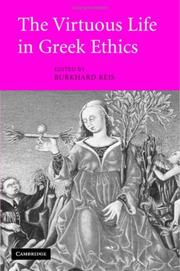| Listing 1 - 5 of 5 |
Sort by
|
Book
ISBN: 3895001287 Year: 1999 Publisher: Wiesbaden Reichert
Abstract | Keywords | Export | Availability | Bookmark
 Loading...
Loading...Choose an application
- Reference Manager
- EndNote
- RefWorks (Direct export to RefWorks)
Neoplatonism --- Albinus.
Book
ISBN: 9783110202366 3110202360 9783110216523 3110216523 1282716697 9786612716690 Year: 2009 Publisher: Berlin de Gruyter
Abstract | Keywords | Export | Availability | Bookmark
 Loading...
Loading...Choose an application
- Reference Manager
- EndNote
- RefWorks (Direct export to RefWorks)
The problem of body and soul has a long history that can be traced back to the beginnings of Greek culture. The existential question of what happened to the soul at the moment of death, whether and in what form there is life after death, and of the exact relationship between body and soul was answered in different ways in Greek philosophy, from the early days to Late Antiquity. The contributions in this volume not only do justice to the breadth of the topic, they also cover the entire period from the Pre-Socratics to Late Antiquity. Particular attention is paid to Plato, Aristotle and Hellenis
Philosophical anthropology --- Mind and body --- Soul --- Philosophy, Ancient --- Esprit et corps --- Ame --- Philosophie ancienne --- Congresses. --- Congrès --- Ancient philosophy --- Greek philosophy --- Philosophy, Greek --- Philosophy, Roman --- Roman philosophy --- Pneuma --- Future life --- Theological anthropology --- Animism --- Spirit --- Conferences - Meetings --- PHILOSOPHY --- Mind and body. --- Philosophy, Ancient. --- Soul. --- Movements --- Humanism. --- Mind & Body. --- Ancient philosophy. --- Philosophy --- Philosophy & Religion --- Philosophy, ancient --- Philosophy, ancient. --- Mind & body. --- Congrès --- Mind and body - Congresses --- Soul - Congresses --- Philosophy, Ancient - Congresses --- Death (Philosophy). --- Soul (Philosophy).

ISBN: 9780521859370 0521859379 9780511482595 9780521125369 9780511226328 0511226322 051122446X 9780511224461 051122513X 9780511225130 051122575X 9780511225758 0511482590 1280567635 9781280567636 1107167337 9781107167339 0511317859 9780511317859 0521125367 Year: 2006 Publisher: Cambridge Cambridge University Press
Abstract | Keywords | Export | Availability | Bookmark
 Loading...
Loading...Choose an application
- Reference Manager
- EndNote
- RefWorks (Direct export to RefWorks)
There is now a renewed concern for moral psychology among moral philosophers. Moreover, contemporary philosophers interested in virtue, moral responsibility and moral progress regularly refer to Plato and Aristotle, the two founding fathers of ancient ethics. The book contains eleven chapters by distinguished scholars which showcase current research in Greek ethics. Four deal with Plato, focusing on the Protagoras, Euthydemus, Symposium and Republic, and discussing matters of literary presentation alongside the philosophical content. The four chapters on Aristotle address problems such as the doctrine of the mean, the status of rules, equity and the tension between altruism and egoism in Aristotelian eudaimonism. A contrast to classical Greek ethics is presented by two chapters reconstructing Epicurus' views on the emotions and moral responsibility as well as on moral development. The final chapter on personal identity in Empedocles shows that the concern for moral progress is already palpable in Presocratic philosophy.
General ethics --- Greece --- Virtue. --- Ethics, Ancient. --- Ethics, Modern --- Conduct of life. --- Plato --- Aristotle --- Influence. --- Conduct of life --- Ethics, Ancient --- Virtue --- Ethics --- Human acts --- Ancient ethics --- Ethics, Practical --- Morals --- Personal conduct --- Philosophical counseling --- Aflāṭūn --- Aplaton --- Bolatu --- Platon, --- Platonas --- Platone --- Po-la-tʻu --- Pʻŭllatʻo --- Pʻŭllatʻon --- Pʻuratʻon --- Πλάτων --- אפלטון --- פלאטא --- פלאטאן --- פלאטו --- أفلاطون --- 柏拉圖 --- 플라톤 --- Aristoteles --- Aristote --- Aristotile --- Platon --- Platoon --- Arisṭāṭṭil --- Aristo, --- Aristotel --- Aristotele --- Aristóteles, --- Aristòtil --- Arisṭū --- Arisṭūṭālīs --- Arisutoteresu --- Arystoteles --- Ya-li-shih-to-te --- Ya-li-ssu-to-te --- Yalishiduode --- Yalisiduode --- Ἀριστοτέλης --- Αριστοτέλης --- Аристотел --- ארסטו --- אריםטו --- אריסטו --- אריסטוטלס --- אריסטוטלוס --- אריסטוטליס --- أرسطاطاليس --- أرسططاليس --- أرسطو --- أرسطوطالس --- أرسطوطاليس --- ابن رشد --- اريسطو --- Pseudo Aristotele --- Pseudo-Aristotle --- Платон --- プラトン --- アリストテレス --- Arts and Humanities --- Philosophy --- Ethics, Modern - 20th century. --- Plato - Influence. --- Aristotle - Influence.
Digital

ISBN: 9783110216523 9783110202366 Year: 2009 Publisher: Berlin ;; Boston De Gruyter
Abstract | Keywords | Export | Availability | Bookmark
 Loading...
Loading...Choose an application
- Reference Manager
- EndNote
- RefWorks (Direct export to RefWorks)
Digital

ISBN: 9783110366358 9783110386325 9783110365405 Year: 2020 Publisher: Berlin ;; Boston De Gruyter
Abstract | Keywords | Export | Availability | Bookmark
 Loading...
Loading...Choose an application
- Reference Manager
- EndNote
- RefWorks (Direct export to RefWorks)
| Listing 1 - 5 of 5 |
Sort by
|

 Search
Search Feedback
Feedback About UniCat
About UniCat  Help
Help News
News